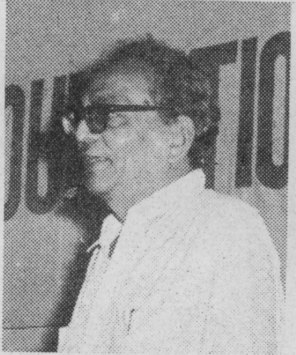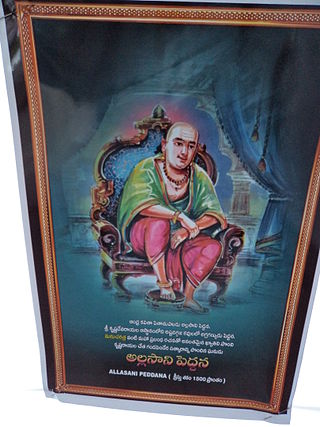
Nandamuri Taraka Rama Rao, often referred to by his initials NTR, was an Indian actor, filmmaker and politician who served as Chief Minister of Andhra Pradesh for seven years over three terms. He starred in over 300 films, predominantly in Telugu cinema, and was referred by the media as Viswa Vikhyatha Nata Sarvabhouma. Rao received three National Film Awards for co-producing Thodu Dongalu (1954) and Seetharama Kalyanam (1960) under National Art Theater, Madras, and for directing Varakatnam (1970). Known for his breakthrough performances in Raju Peda (1954) and Lava Kusa (1963), Rao garnered the Nandi Award for Best Actor for Kodalu Diddina Kapuram in 1970, and the Inaugural Filmfare Award for Best Actor – Telugu in 1972 for Badi Panthulu.

Srirangam Srinivasa Rao, popularly known as Sri Sri, was an Indian poet and lyricist who is known for his works in Telugu literature and films. Noted for his anthology Maha Prasthanam, Sri Sri is a recipient of a National Film Award, a Nandi Award and a Sahitya Akademi Award.
Tenali Ramakrishna ( Telugu: తెనాలి రామకృష్ణ కవి / తెనాలి రామలింగడు/ తెనాలి రామకృష్ణుడు )was an Indian poet, scholar, thinker and a special advisor in the court of the Vijayanagara king Krishnadevaraya, who ruled from C.E. 1509 to 1529. He wrote poems in Telugu and hailed from the village of Tenali, generally known for the folk tales which focus on his wit. He was one of the Ashtadiggajas or the eight poets at the court of Krishnadevaraya.

Mayabazar is a 1957 Indian epic Hindu mythological film directed by K. V. Reddy. It was produced by Nagi Reddi and Chakrapani under their banner, Vijaya Productions. The film was shot simultaneously in Telugu and Tamil, with a few differences in the cast. The story is an adaptation of the folk tale Sasirekha Parinayam, which is based on the characters of the epic Mahabharata. It revolves around the roles of Krishna and Ghatotkacha, as they try to reunite Arjuna's son Abhimanyu with his love, Balarama's daughter (Savitri). The Telugu version features Gummadi, Mukkamala, Ramana Reddy, and Relangi in supporting roles, with D. Balasubramaniam, R. Balasubramaniam, V. M. Ezhumalai, and K. A. Thangavelu playing those parts in the Tamil version.

Telugu literature is the body of works written in the Telugu language. It consists of poems, short stories, novels, plays, and song lyrics, among others. There is some indication that Telugu literature dates at least to the middle of the first millennium, the first extant works are from the 11th century when the Mahabharata was first translated to Telugu from Sanskrit by Nannaya. The language experienced a golden age under the patronage of the Vijayanagara king-poet Krishnadevaraya.

Allasani Peddana was a famous Telugu poet and was ranked as the foremost of the Ashtadiggajalu, the title for the group of eight poets in the court of Emperor Krishnadevaraya, a ruler of the Vijayanagara Empire.

Ghattamaneni Siva Rama Krishna Murthy, known mononymously as Krishna, was an Indian actor, director and producer known for his work predominantly in Telugu cinema. In a career spanning more than five decades, he starred in over 350 films in a variety of roles. He is referred to as "Superstar" in the Telugu media. In 2009, the government of India honoured him with the Padma Bhushan for his contributions to Indian cinema. He was elected as a Member of Parliament for the Congress party in 1989. In 1997, he received the Filmfare Lifetime Achievement Award – South in addition to Honorary doctorate from Andhra University in 2008. He died on 15 November 2022 due to cardiac arrest.

Gadde Rajendra Prasad is an Indian actor who predominantly works in Telugu films. He is a recipient of four Andhra Pradesh state Nandi Awards, three SIIMA Awards, and three Santosham Film Awards.
Tadepalli Lakshmi Kantha Rao was an Indian actor and producer known for his works predominantly in Telugu cinema. Regarded as one of the finest method actors, Rao appeared in more than 400 feature films, starring in many, in a variety of genres including mythological, social and folklore. He has also acted in a few Hindi, Kannada, Tamil, and Malayalam movies. He has produced about five films under the Hyma Films banner. In the 1960s, he was one of the primary actors in Telugu cinema, along with N. T. Rama Rao and Akkineni Nageswara Rao. Kantha Rao was known for portraying the roles of Narada, Lord Krishna and Arjuna. He played Lakshmana in the blockbuster film Lava Kusa, for which he received Vishehsa Puraskaram in 1963.

Telugu theatre is Indian theatre in the Telugu language, based in the states of Andhra Pradesh and Telangana. Gurajada Apparao wrote the play, Kanyasulkam in 1892, which is often considered the greatest play in the Telugu language. C. Pullaiah is cited as the father of Telugu theatre movement.

Kadiri Venkata Reddy was an Indian film director, screenwriter, and producer who primarily worked in Telugu cinema. He is regarded as an influential director in South Indian cinema. He directed 14 feature films and won three National Film Awards and a Filmfare Award South.
Nerella Venu Madhav was an Indian impressionist and ventriloquist. He rose to popularity imitating celebrities, politicians, local dialects, Nizams and was the first to perform at the United Nations headquarters. He started a diploma course at Telugu University, a first in the world. He is often regarded as father of Indian mimicry. He is also hailed as the pioneer and maestro of mimicry in India.

T. Krishna Kumari was an Indian actress. She worked predominantly in Telugu films, in addition to Tamil and Kannada films in the 1950s and 1960s. She was the sister of noted actress Sowkar Janaki.

Sri Krishna Rayabaram is a popular Telugu drama written by Tirupati Venkata Kavulu in the early 20th century. It was made into a Telugu film in 1960. Many actors and companies have staged this production throughout Andhra Pradesh, India, and abroad.

Pellinaati Pramanalu is a 1958 Indian Telugu-language comedy drama film, produced and directed by K. V. Reddy. It stars Akkineni Nageswara Rao and Jamuna, with music composed by Ghantasala. The film was simultaneously made in Tamil as Vaazhkai Oppandham with a slightly different cast that released the following year.

Viswanatha Satyanarayana was a 20th-century Telugu writer. His works included poetry, novels, dramatic play, short stories and speeches, covering a wide range of subjects such as analysis of history, philosophy, religion, sociology, political science, linguistics, psychology and consciousness studies, epistemology, aesthetics and spiritualism. He was a student of the illustrious Telugu writer Chellapilla Venkata Sastry, of the Tirupati Venkata Kavulu duo. Viswanatha's wrote in both a modern and classical style, in complex modes. His popular works include Ramayana Kalpavrukshamu, Kinnersani Patalu and the novel Veyipadagalu. Among many awards, he was awarded the Jnanpith Award in 1970, the first for a Telugu writer, and Padma Bhushan in 1971.
Rayasam Venkata Tripurantakeswara Rao popularly known as Tripura is a famous Telugu short story writer of the 1960s and 1970s. He was born on 2 September 1928 in Purushottampur Tehsil of Ganjam District of Orissa state, India. His father was a surgeon and worked in Government Hospital there.

Allari Priyudu is a 1993 Indian Telugu-language musical romantic comedy film directed by K. Raghavendra Rao. The film stars Rajasekhar, Ramya Krishna and Madhu Bala. The film was premiered at the 1994 International Film Festival of India in the mainstream section. The film is adaptation of Hindi film Saajan.The film was dubbed into Tamil as Yaarukku Mappillai Yaaro. It was remade in Kannada as Chora Chittha Chora, with V. Ravichandran, Namrata Shirodkar and Malavika. The film was recorded as a Blockbuster at the box office. The film won two Filmfare Awards & two Nandi Awards.

Asavadi Prakasa Rao was an Indian poet, critic, translator and scholar, who is known for his poetry and prose works. He is noted for his significant contribution to Telugu and Sanskrit literature. In January 2021, he was awarded India's fourth-highest civilian award the Padma Shri in the Arts and Literature category. As Ashtavadhani, he has given 170 performances and has written and published 50 books across various genres. His most notable literary contribution is his performance of Avadhanam – a literary performance. He has received an honorary D Litt from Potti Sreeramulu Telugu University and a Distinguished Teacher award from the Department of Higher Education, Government of Andhra Pradesh.













